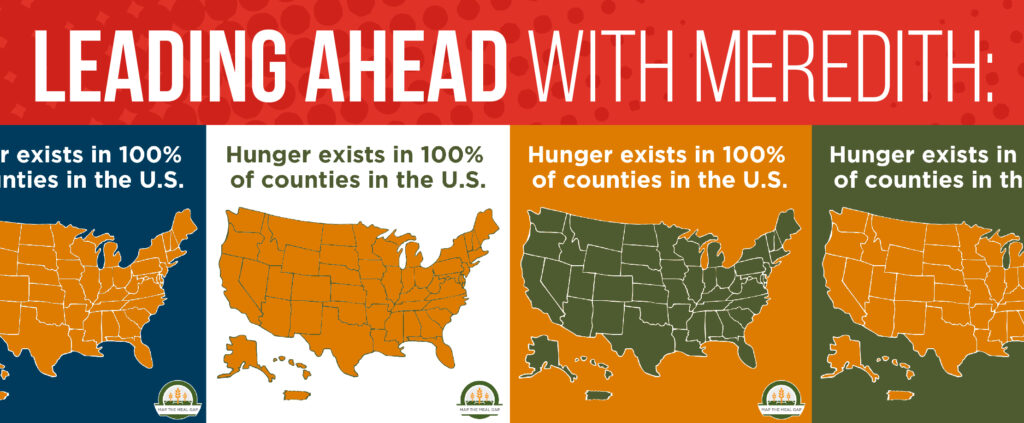Americans who have never gone to bed hungry or skipped a meal so their children could eat may not be familiar with the definition of food insecurity and what it means in human terms to those who suffer from it.
The U.S. Department of Agriculture (USDA) defines food insecurity as a lack of consistent access to enough food for an active, healthy life. While hunger refers to a personal, physical sensation of discomfort, food insecurity refers to a lack of available financial resources for food at the household level. According to the USDA’s standard, roughly 35 million Americans were unable to buy sufficient groceries to feed their families prior to the arrival of COVID-19. Today, with more than 26.5 million Americans unemployed or furloughed, hundreds of thousands of working-class families are learning first-hand how frightening and overwhelming it is to be food insecure.

FOOD INSECURE FOR THE FIRST TIME
Families like Jenny’s. The 30-something mom was sitting in her idling car on a recent Tuesday morning, waiting for the weekly food distribution to begin at Trinity Church of the Nazarene in Florissant, Missouri. She and her husband, who live two blocks from the church, were a typical duel income, two children family up until March 23. That week stay-at-home orders began taking a toll on employment throughout St. Louis City and County—and counties surrounding the metropolitan area.
“It was like an ax falling. Without warning, all of this hit,” Jenny said, adding, “We were working up to that point. My husband and I were both furloughed within a matter of 48 hours.” Her husband works in recruiting and Jenny is employed in an administrative role at a construction company. She said that while her business qualified to remain open under the essential worker policy, people didn’t want construction workers in their home, which impacted her employer’s ability to pay staff.
“We’re still on furlough, and it’s pretty humbling,” she said, referring to the need for food assistance. “Through another organization, we do a massive amount of food collection for two weeks every November to help feed those in need,” she paused as tears welled in her eyes. “And now we’re receiving food. This is completely humbling on a whole different level.”
Like so many families struggling in these uncertain times, Jenny said that it has been a challenge to explain their current circumstances to her children, 13 and 11-year old boys. “We try to explain it on a level that they can understand: that they are safe and that we’re going to be okay and things will come back to some kind of normal, be it a new way of doing things.”
Although they are collecting unemployment benefits, she said that “there still is a lot of uncertainty” about how the family will manage financially until they return to work. It’s unclear to her whether or not their jobs will be restored immediately when St. Louis County’s stay-at-home orders are lifted. “Initially, it was very, very scary, especially the first week,” Jenny said, adding. “We’re playing a waiting game.
The good news is that there are enough local programs and resources that we are doing okay. Thank goodness for programs like Trinity’s. We also are receiving assistance from the school district (Florissant-Ferguson) through the lunch program. But without the Foodbank [St. Louis Area Foodbank], we would be in trouble.
“I have to be honest, the first time I pulled up [at the church] to get food, the first week it was posted on social media and I was able to receive groceries, to now be on the receiving end, there are no words for that feeling,” she continued, tearfully. “It was eye-opening, it really was. I am beyond thankful.”
Jenny added that she couldn’t believe the relief she felt receiving food assistance for the very first time. “There was milk, there were eggs, there were vegetables, there were staples. To have those fresh items, it gives you a sense of normalcy to offer those to your children. And to know that on some level, we’re okay. And we’re going to get through this.”

FOOD INSECURITY DURING COVID-19
Others in line feel the same kind of relief as Jenny’s as they wait to receive this week’s offerings of fresh foods and non-perishables provided by the St. Louis Area Foodbank.
Trina was laid off from the local Olive Garden when it was shut down due to stay-at-home orders. Although she has applied for unemployment benefits, she has yet to receive a check. She also hasn’t received a stimulus check. This is her second visit to the mobile market. Trina said she isn’t sure what she would do without food distributions like the one at Trinity Church. “I would go hungry,” she stated.
Mary is a senior whose monthly Social Security check has been garnished by the federal government to pay overdue taxes. She said mobile food distributions, like the one at Trinity, are her only source of food at the moment. She would like to find a job to ease her financial difficulties, but the pandemic and her age are working against her. “Being 72, it’s not so easy to find a job anymore, she said. “I fill out applications and receive calls and they will ask me what year I graduated from high school. When they guess my age, I don’t get the job.” Asked what she would do without the food assistance she is receiving, Mary said she would “go to bed hungry.”
Another senior, Sandra, has a daughter living at home who is working 12-hour shifts in a nearby nursing home. Even with Social Security and her daughter’s income, they have difficulty stretching their food budget for an entire month. The food that she receives today will tide them over for another week.
RESPONDING TO THE NEEDS OF THE COMMUNITY
Kyle Rainbolt is the pastor of Trinity Church of the Nazarene in Florissant. He described Florissant as a “working poor” community. According to the most recent census data, the median household income in Florissant is slightly more than $52,000 a year.  Prior to March, the church was holding a mobile market once a month. Since the pandemic’s arrival,
Prior to March, the church was holding a mobile market once a month. Since the pandemic’s arrival,
Rainbolt has seen a noticeable spike in those seeking food assistance in his community—many for the very first time. In response to the stay-at-home orders in March and the subsequent surge in unemployment, Rainbolt realized there was a need to expand the size and frequencies of the church’s food distribution program. “We knew our community and that food was going to be one of their basic needs. We knew what we needed to do in that moment,” he stated.
In partnership with the St. Louis Area Foodbank, the church was distributing between 7,000-9,000 pounds of food once a month. Now the number of pounds distributed each week is nearly double that amount. “We went from feeding 125 families a month, at the most, to as high as 400 families in a day,” he said, adding, “We have many families who either have been furloughed or they are working less hours. A little bit of extra food is helping in the moment. And a lot of people are telling us they’ve lost their jobs and they don’t know how they are going to provide food for their families.”
Providing a little food makes a big difference for those in need, said Rainbolt. At the mobile market on Tuesday, April 28, dozens of cars begin lining up three hours in advance of the 11 a.m. start time. A group of church volunteers, along with four members of the Missouri National Guard, are busy packing bags filled with a variety of fresh vegetables and fruits, including two types of apples, potatoes, carrots, onions and cabbage. There also is a wide assortment of non-perishables, including soups, pasta, tomato sauce, stuffing mix, cake mixes, beans, rice, single-serving size snacks, juices and cleaning supplies like laundry and dishwashing detergents. There also is a frozen pumpkin pie for each family to take home. When the market opens, cars will move slowly through the line, trunks open, to allow masked and gloved volunteers to place the groceries into vehicles while remaining at a safe distance.
Rainbolt noted that the Foodbank had sent almost all fresh produce for the prior week’s market. “Produce can be expensive,” he added. “We know for those on a low or fixed income that produce is expensive and so they don’t often buy it because they are trying to stretch their food dollars. So it’s nice to be able to give fresh produce.”
Trinity Church is committed to holding weekly mobile markets until the end of May but may extend them based on demand. “We will continue to do so until the need disappears, “ said Rainbolt.

